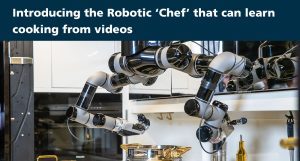Researchers at the University of Cambridge have achieved a significant breakthrough by training a robotic chef to watch cooking videos and replicate the recipes. Equipped with a ‘cookbook’ containing eight simple salad recipes, the robot utilized video demonstrations to identify the recipe being prepared and recreate it. Remarkably, the robot even developed its own unique recipe after analyzing the videos. Published in IEEE Access, this study highlights the potential of video content as a valuable resource for automated food production, paving the way for more accessible and cost-effective deployment of robot chefs.




